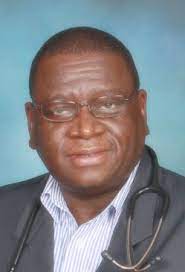
Nestor Galvez-Jimenez, MD, Neurologist, Cleveland Clinic, Florida
July 12, 2022 – To help raise awareness in The Bahamas about Parkinson’s disease, a leading neurologist from Cleveland Clinic, Florida, Dr Nestor Galvez-Jimenez, recently teamed up with the Kingdor Parkinson Foundation and local neurologist, Dr Edwin Demeritte, in a Zoom interview to talk about life with the disease.
With hundreds of Bahamians suffering from Parkinson’s disease, Dr. Nestor Galvez-Jimenez, said one of the best therapies for the disease that has no cure is exercise.
Describing it as a “condition of the aging brain”, Galvez-Jimenez said Parkinson’s is a progressive, neurodegenerative disorder that typically impacts people over the age of 50.
While there are treatments on the market to help manage the symptoms — tremors, stiffness, slower movement, among others — Galvez-Jimenez said his best patients are those who exercise regularly.
“I can tell you that I have patients with Parkinson’s disease who are in their 90s and they still go on the treadmill, they walk,” he said.
“And I have to tell you, of the exercises, the ones that have shown to be helpful is Tai Chi for balance, biking, either stationary or non-stationary, has been shown to be helpful, and boxing has also shown to be helpful.”
Galvez-Jimenez said all those exercises keep participants moving, but noted that Tai Chi, tennis and boxing are particularly good for balance and reflexes.

Mavis Darling-Hill, President, Kingdor Parkinson Foundation
“So, you know, I just tell patients you need to keep active,” he said. “And whatever you do is better than nothing, because the normal tendency for someone with Parkinson’s is to just slow down and become a couch potato. Read books as well, cognitively speaking, and keep social.”
Parkinson’s is believed to impact far more Bahamians than those who seek professional help, according to Parkinson’s Foundation President Mavis Darling-Hill, who described it as a “closeted disease.”
“We imagine, looking at our population of older persons over 60 years old, there could be a couple of thousand [cases] here, because…the signs and symptoms are very difficult in the early stage, a lot of persons will try to hide the disease,” she said.
“And only when it gets to the point where they cannot hide it enough, they’d come forward or admit to it.”
Dr. Edwin Demeritte, one of just three neurologists in The Bahamas and the only Paediatric Neurologist, said the lack of uniform medical record keeping also complicates the issue.
“When we look at our record keeping systems, we’re not uniform with electronic medical records,” he said.

Dr. Edwin Demeritte, Neurologist, Bahamas Neurological Center
“So, again, one of the issues is using paper records instead of electronic medical records in coming up with the exact numbers. So, at this point in time, we probably may have maybe somewhere between 500 and 1000 people who have come forth, but a lot of those persons are not captured in our system because there’s no uniform medical record keeping.”
However, Demeritte noted that work is underway to correct the matter.
As it relates to the issue of social stigmatization, Galvez-Jimenez said better education on Parkinson’s is important.
“I can clearly understand what was said about having some sort of social stigma about some of these things because, you know, we need to educate our patients and the population,” he said.
“You know, there’s nothing wrong with Parkinson’s. It’s another condition that affects the brain. And one thing that I try to tell them is if somebody has diabetes or has high blood pressure, usually you don’t think about it. You just say I’m going to take my medication for high blood pressure or take my medication for my diabetes.
“Well, we have to start thinking about Parkinson’s disease and all the Parkinsonian syndromes the same way. You know, we have treatment options… but the idea is to make people comfortable enough to open up and speak about it.
“So, education is important.”


 Caribbean News7 days ago
Caribbean News7 days ago
 Caribbean News7 days ago
Caribbean News7 days ago
 Caribbean News1 week ago
Caribbean News1 week ago
 Caribbean News7 days ago
Caribbean News7 days ago
 Bahamas News7 days ago
Bahamas News7 days ago
 News7 days ago
News7 days ago
 Bahamas News1 week ago
Bahamas News1 week ago
 News7 days ago
News7 days ago


















